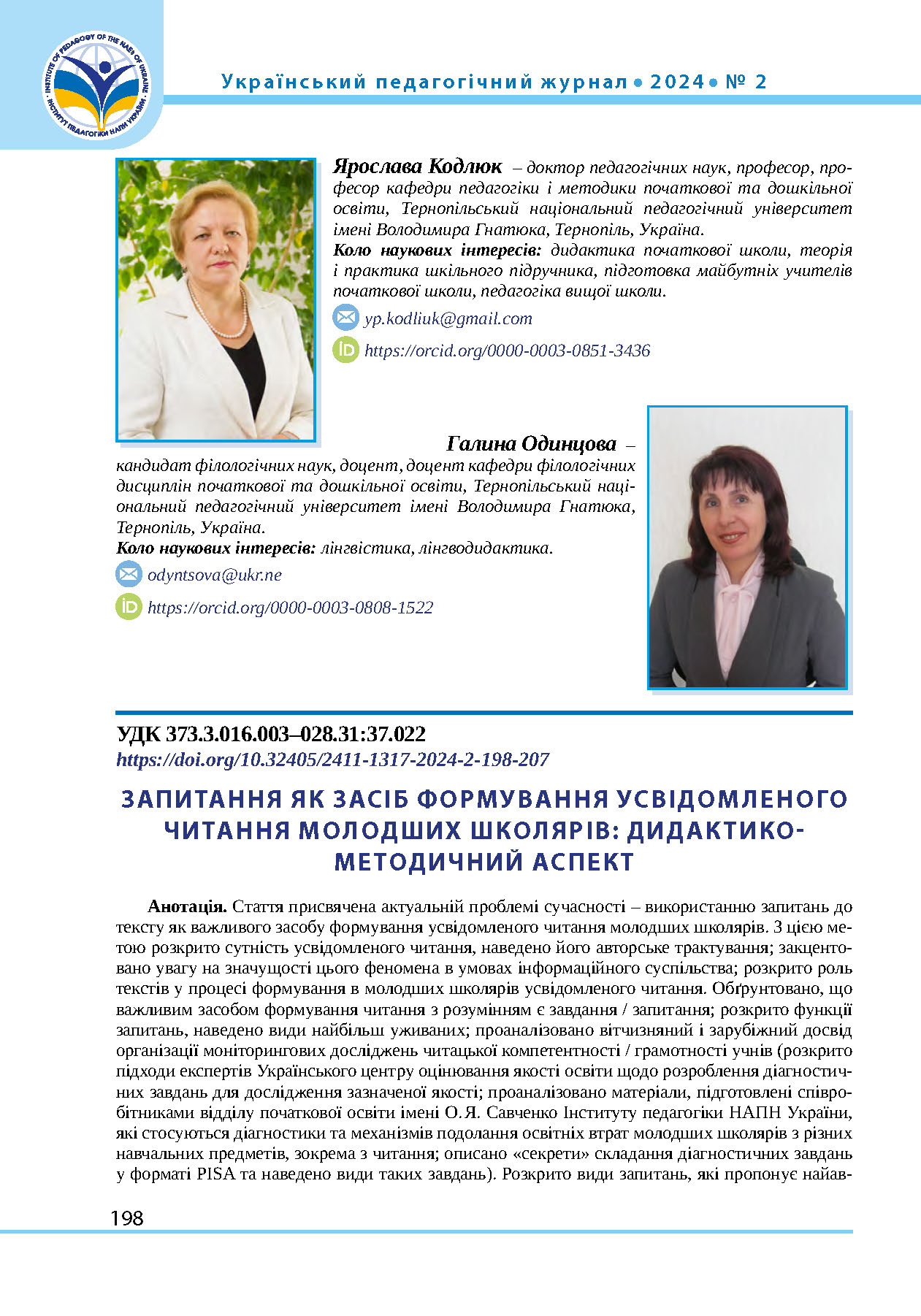Abstract
The article deals with an actual problem of our time – the use of questions to the text as an important means of primary school students conscious reading formation. For this purpose, the essence of conscious reading has been revealed, its author's definition has been given. Attention has been focused on the significance of this phenomenon in the conditions of information society, and the role of texts in the process of primary school students conscious reading formation has been analyzed. It has been substantiated that tasks/questions is an important means of reading comprehension formation; the functions of questions have been provided, the types of the most used ones have been given; domestic and foreign experience in organizing monitoring studies of students' reading competence / literacy has been analyzed (the approaches of the experts of the Ukrainian Center for Educational Quality Assessment regarding the development of diagnostic tasks for the study of the specified quality have been revealed; the materials prepared by the employees of the O. Ya. Savchenko Department of Primary Education of the Institute of Pedagogy of the National Academy of Educational Sciences of Ukraine have been analyzed, which relate to the diagnosis and mechanisms of overcoming the educational losses of primary school students in various academic subjects, in particular in reading; the «secrets» of compiling diagnostic tasks in PISA format have been described and the types of such tasks have been given). The types of questions proposed by the most authoritative international PIRLS study, which tests the level of conscious reading formation in 10-year-old children, have been revealed. These questions are built taking into account the increasing complexity and provide for 12 levels of depth of text analysis, in particular: for finding words and phrases in the text; for reproducing the storyline; questions, the illustration of which is a false clue; questions for which it is necessary to choose the correct synonym or close options (without rereading); for reproducing the facts; questions on transferring information into a figurative series; for searching for evidence for theses; questions, the answers to which are not contained in the text; questions on understanding the multiple meanings of words, proverbs; on the hidden motivation of the heroes; for generalizing reading, synthesis; questions that «trigger» reflection. The method of using these questions has been illustrated on the example of Oleh Butsen story «Pustoshchi» (transliterated), recommended for study by 4th grade students.
References
Бондаренко, Н. В. (2020). Запитання як пусковий механізм світопізнання й компетентнісного навчання. Fundamental and applied research in the modern world. Abstracts of ІІІ International scientific and practical conference. Boston: BoScience Publisher, 195–204.
Бондаренко, Н., & Косянчук, С. (2021). Класифікаційна модель запитань для реалізації в освітньому процесі. Нова педагогічна думка, 1(105), 12–17.
Кодлюк, Я., & Одинцова, Г. (2022). Формування у молодших школярів усвідомленого читання засобами навчальних текстів підручника. Слово. Стратегії. Інновації: колективна монографія. Тернопіль: Осадца Ю. В., 6–62.
Пометун, О., & Гупан, Н. (2021). Методика розвитку критичного мислення учнів ліцею на уроках історії: методичний посібник. Електронне видання. Київ: КОНВІ ПРІНТ. https://undip.org.ua/wp-content/uploads/2021/12/Metodyka_rozvytku_krytychnoho_myslennia.pdf
Пометун, О. (2019). Запитання на уроці: Навіщо? До кого? Як і про що? : метод. посібник для вчителів загальноосвітніх шкіл. Київ.
Рекомендації щодо формування читацької компетентності учнів на рівні початкової освіти. https://testportal.gov.ua//wp-content/uploads/2022/10/chyt-gram-24-10-22.pdf
Садкіна, В. І. (2021). Маленькі секрети учительського успіху. Навчаємо з радістю. Харків: Основа.
Терещенко, В., & Клименко, І. (Ред.). (2023). Національний звіт за результатами міжнародного дослідження якості освіти PISA-2022. Київ.
Топузов, О. М. (Ред.). (2023). Діагностика та механізми подолання втрат у навчанні молодших школярів: методичні рекомендації. Електронне видання. Київ: Інститут педагогіки НАПН України. https://undip.org.ua/wp-content/uploads/2023/09/Diahnostyka-ta-mekhanizmy-podolannia-vtrat-u-navchanni-3.pdf
Усвідомлене читання: 12 рівнів запитань, що допоможуть розвинути читання з розумінням. https://osvitoria.media/opinions/usvidomlene-chytannya-12-rivniv-zapytan-shho-dopomozhut-rozvynuty-chytannya-z-rozuminnyam/
Bondarenko, N. V. (2020). Zapytannia yak puskovyi mekhanizm svitopiznannia y kompetentnisnoho navchannia. Fundamental and applied research in the modern world. Abstracts of ІІІ International scientific and practical conference. Boston: BoScience Publisher, 195–204 (in Ukrainian).
Bondarenko, N., & Kosianchuk, S. (2021). Klasyfikatsiina model zapytan dlia realizatsii v osvitnomu protsesi. Nova pedahohichna dumka, 1(105), 12–17 (in Ukrainian).
Kodliuk, Ya., & Odyntsova, H. (2022). Formuvannia u molodshykh shkoliariv usvidomlenoho chytannia zasobamy navchalnykh tekstiv pidruchnyka. Slovo. Stratehii. Innovatsii : kolektyvna monohrafiia. Ternopil: Osadtsa Yu. V. , 6–62 (in Ukrainian).
Pometun, O., & Hupan, N. (2021). Metodyka rozvytku krytychnoho myslennia uchniv litseiu na urokakh istorii: metodychnyi posibnyk. Elektronne vydannia. Kyiv: KONVI PRINT. https://undip.org.ua/wp-content/uploads/2021/12/Metodyka_rozvytku_krytychnoho_myslennia.pdf (in Ukrainian).
Pometun, O. (2019). Zapytannia na urotsi: Navishcho? Do koho? Yak i pro shcho? : metod. posibnyk dlia vchyteliv zahalnoosvitnikh shkil. Kyiv (in Ukrainian).
Rekomendatsii shchodo formuvannia chytatskoi kompetentnosti uchniv na rivni pochatkovoi osvity. https://testportal.gov.ua//wp-content/uploads/2022/10/chyt-gram-24-10-22.pdf (in Ukrainian).
Sadkina, V. I. (2021). Malenki sekrety uchytelskoho uspikhu. Navchaiemo z radistiu. Kharkiv: Osnova (in Ukrainian).
Tereshchenko, V., & Klymenko, I. (Red.). (2023). Natsionalnyi zvit za rezultatamy mizhnarodnoho doslidzhennia yakosti osvity PISA-2022. Kyiv (in Ukrainian).
Topuzov, O. M. (Red.). (2023). Diahnostyka ta mekhanizmy podolannia vtrat u navchanni molodshykh shkoliariv: metodychni rekomendatsii. Elektronne vydannia. Kyiv: Instytut pedahohiky NAPN Ukrainy. https://undip.org.ua/wp-content/uploads/2023/09/Diahnostyka-ta-mekhanizmy-podolannia-vtrat-u-navchanni-3.pdf (in Ukrainian).
Usvidomlene chytannia: 12 rivniv zapytan, shcho dopomozhut rozvynuty chytannia z rozuminniam. https://osvitoria.media/opinions/usvidomlene-chytannya-12-rivniv-zapytan-shho-dopomozhut-rozvynuty-chytannya-z-rozuminnyam/ (in Ukrainian).

This work is licensed under a Creative Commons Attribution-NonCommercial-ShareAlike 4.0 International License.


